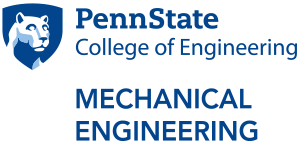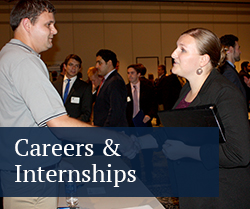Getting the Most from Your Mentor Relationship
The Penn State Mechanical Engineering Society mentoring program facilitates a one-to-one relationship between a current student and an alumnus for guidance, information, and networking.
Open communication is the foundation of a productive student-mentor relationship. It should be fun but professional. Students should be enthusiastic and assertive in communicating their individual interests and needs. One of the greatest ways in which a mentor may be an asset to a student is by sharing real world work experiences. Students should take advantage of this asset by asking questions about the workplace and how best to prepare for specific work environments.
Students may discuss a range of topics with mentors, from school work and career goals to extra-curricular activities and relationships with other students, faculty, and staff. Remember that while mentors play many different roles throughout the relationship, the mentor is not a parent or counselor. Most importantly, students must keep their commitments and remember that their mentors have volunteered this time to be of service to them.
Tips to Remember
- Discuss guidelines with your mentor, such as appropriate times for both of you to meet, call, and how to handle appointments that must be broken, etc.
- Mentors are generally busy professionals
- Be prepared for every meeting and start on time
- Do not break appointments unless it is absolutely necessary
- Have fun with the relationship, but keep it professional
- Be yourself
- Share your student experiences
- Ask if your mentor would mind critiquing your work, such as résumé, papers, projects, or presentations.
- Be grateful; If your mentor takes the time to critique your work, thank them
- Keep in mind that confidential information about you will not be discussed with anyone
- Be patient
- Be flexible
- Don’t set unrealistic expectations
Action Planning
Working with your mentor on an action plan for the mentoring relationship is a great way to get started. It will help you get acquainted while developing your goals and the basic steps you and your mentor can take together to achieve them. An action planning form is included in your mentoring handbook to help guide you through the process.
Interacting with your Mentor
Do not worry if you feel nervous about contacting or talking to your mentor. Remember that your mentor volunteered to help answer your questions, give you advice, and to help you reach a greater understanding of your field of interest and your educational and career goals. The best way they can help you is if you are enthusiastic and not afraid to ask plenty of questions. Be assertive.
Your shared objective should be you achieve a successful start to a good career. Within that overall objective, what you do with your mentor, and how you do it, is up to the two of you to agree on. You should set the direction (it is your career!). If you want input, ask, but don’t ask the mentor to make decisions for you.
Respect your mentor’s commitment by making good use of their time. It is always your choice whether to accept or act on any advice or help that your mentor offers. But if you ask your mentor to do anything, then you should make use of what they have done.
You should feel free to discuss any subject with your mentor. The focus of your relationship with your mentor should be career and professional development. Most will probably relate to your course work and your relationships with other students, faculty, advisors, extra‐curricular activities, and other school related subjects.
Here are some suggested questions to ask your mentor about the workplace for which you are preparing:
- What do you like most/find most interesting about your work?
- What kinds of problems do you face? Find most difficult?
- What skills/abilities do you find are most important in your work?
- What trade journal or magazine I should review to learn more my future career?
- What is the typical work environment like for a person in this career area?
- What are the basic prerequisites for jobs in this field?
- Are there any specific courses a student might take that would be particularly beneficial?
- What entry‐level jobs are available in your chosen field?
- What special advice would you give to a person entering this field?
- Is there a demand for people in this field?
- Do you view this field as a growing one?
- What is the best way to obtain a position that will start me on a career in this field?
- How much flexibility does one typically have regarding innovation, life‐style, self‐expression, working with colleagues (co‐workers), hours of work, and decision‐making (authority)?
Mentors will not do your career development work for you. They may provide contacts or review your resume. You must call the contacts or write the resume.
What your mentor can be for you
- Advocate
- Coach
- Developer of talent
- Friend
- Positive role model
- Sponsor
- Trainer
- Facilitator of self‐esteem and self‐confidence
- Career skills adviser
- Job reference
What your mentor cannot be for you
- A parent
- A professional counselor
- An employment counselor
- A social worker
You may find that you develop a rewarding relationship with your mentor in the course of your work together, which continues beyond graduation. If so, great! But even if this does not develop, your mentor can still help you to get off to a great start in your career.






